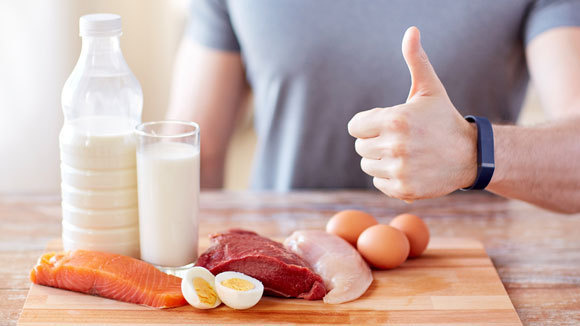6 Signs You Should Eat More Protein
Experts say most people over 50 fall short of their protein requirements. Here’s how you can tell if you need to eat more
By Marisa Sandora
Our society seems to have become obsessed with protein, with meat-centric diet plans like The Paleo Diet and Atkins über-popular right now. Turns out, an emphasis on protein may be just the thing for older adults, who likely need to increase their intake. Starting around age 50, we progressively lose muscle, a natural condition of aging known as sarcopenia.
How Much Should You Eat?
The recommended daily allowance of protein for adults is 0.36 grams per pound of body weight per day, which translates to 54 grams for a 150-pound adult. (Todaysdietician.comhas a helpful chart detailing the protein content of various foods.) But research suggests that protein requirements increase with age, and we would be wise to eat more.
“Protein is important not just for building muscle but for maintaining muscle, which is a concern for older adults,” says registered dietician and nutritionist Isabel Maples, spokesperson for the Academy of Nutrition and Dietetics. “Maintaining muscle helps you function better [and] helps to prevent falls, which is so important.”
The exact amount of protein you should consume beyond the recommended daily allowance is still up for debate and may depend on your activity level, but experts suggest aiming for at least the recommended amount, since most older adults fall short. How do you know if you need more? Here are six signs to watch for:
#1: You’re getting sick more often
“Protein helps boost our immunity,” says Maples. “It drives the daily function of our body, regulating hormones and maintaining the white blood cells that are fighting off disease and infections.” So if you tend to get sick more than everyone you know and are constantly fighting something, it could be a sign you are protein deficient.
#2: You’re noticing swelling in your feet/ankles
Protein helps regulate the amount of fluid in your tissues, as well as how your muscles contract, which enables you to move fluid out of your lower legs and ankles. Edema, temporary swelling due to fluid retention, can also be a sign of other medical problems, so always check with your doctor if you notice any unusual swelling.
#3: You’re tired and lethargic
“Being tired and draggy can signal a lack of protein, and a lot of times, it can be an iron issue, too,” says Elizabeth Landsverk, MD, founder of ElderConsult Geriatric Medicine, a house-calls practice for older adults in the San Francisco Bay Area. The body needs protein and iron to produce hemoglobin, the iron-rich protein responsible for carrying oxygen throughout the body. This lack of oxygen to the cells in the body results in fatigue.
#4: Your skin doesn’t look healthy
“Often when people don’t get enough protein, wounds don’t heal as fast, and skin looks paler and drier,” says Maples. Protein is necessary for tissue repair, so a lack of protein in the diet can result in skin issues. Pale skin may also be a sign of an iron deficiency.
#5: You’re nails are brittle and you get more hangnails
Brittle, flaking nails, nails with ridges and white lines, and an increased propensity for hangnails can all be a sign you need to eat more protein, says Maples. Nails are made of a protein called keratin, and a lack of protein in the diet often affects nail health.
#6: You’re losing weight
“We often think of weight loss as a good thing, but sometimes it can be a sign of muscle loss,” says Dr. Landsverk. Muscle weighs more than fat, so changing body composition can result in weight loss that translates to a loss of strength and agility. “Often older adults aren’t eating as much, and that can be dangerous,” says Dr. Landsverk. “It can result in fragility and problems with balance.”
The Best Ways to Eat More Protein
Looking for healthy ways to increase your protein intake? Meat is a good source, but don’t go crazy on red meat, which can be high in saturated fat, says Dr. Landsverk. Consider pork and poultry as well as non-meat options such as fish, eggs, nuts, beans, tofu, and cheese. “It all adds up,” says Maples. “And you don’t want to try and get it all at dinner.” So have eggs for breakfast, sprinkle nuts on your salad at lunch and snack on string cheese in the afternoon. “It comes down to what you like, and what you’ll eat,” says Dr. Landsverk. “Often, older adults don’t have the appetite or drive to cook that younger people do. I often suggest ice cream because it has protein, calcium and fluids.”
If you can increase your protein intake, it will go a long way toward improving your overall health and wellbeing, especially if you also exercise to convert that protein to muscle. Says Dr. Landsverk, “Protein is important because it allows us to maintain our strength and independence. You’re more likely to live longer and live better.”
Elizabeth Landsverk, MD Geriatrician

Elizabeth (Dr Liz) has over twenty years of experience in providing medical care to the elders. She is board-certified in Internal Medicine, Geriatric Medicine and Palliative Care Medicine. Dr Landsverk founded ElderConsult Geriatric Medicine, a house calls practice, to address the challenging medical and behavioral issues often facing older patients and their families.


